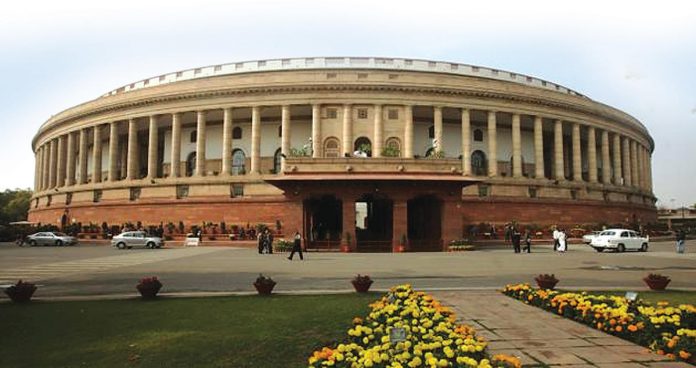This article is written by Oishika Banerji of Amity Law School, Kolkata. This article discusses what a Bill lapse in the Indian Parliament is, its cause, and its consequence.
Table of Contents
Introduction
Generally speaking, the legislature is the law-making organ of the government, and every legislative proposal takes the shape of a Bill which is a statute that has been drafted but does not become a law of the country until it receives the President’s assent. Before the Bill is brought before the President of the nation, it passes through three readings in each of the Houses of the Parliament namely the Rajya Sabha (Upper House), and the Lok Sabha (Lower House). The three readings are:
- The first reading which involves the introduction of the Bill in the House;
- The second reading involves discussion on Bill’s principle and clauses;
- The third reading revolves around the discussion on the motion of the Bill.
A similar kind of procedure is also followed in the State Legislature. Now after these readings, the Bill is passed to the Upper House of the Parliament by the Lower House in which the Bill originated. This is when the concept of “lapse of a Bill” steps in. Broadly, a parliamentary Bill lapses on two grounds;
- When a Bill is pending in the Lok Sabha waiting for it to be passed to the Rajya Sabha; and
- When a Bill is pending in the Rajya Sabha after it has been passed by the Lok Sabha.
In either case, the Bill lapses in the Indian Parliament thereby retarding the speed of the Bill to get the President’s assent thereby becoming an Act, or otherwise the law of the land. This article discusses the grounds of the lapse of a Bill in detail and throws light on the issue of lapsing of a Bill which subsequently becomes a detriment for both the Union and the State Legislature.
When does a Bill lapse in the Indian Parliament
Whenever the discussion about Bill lapses comes in, it is to be noted that only the Lok Sabha or the Lower House, and the State Legislative Assembly is subjected to dissolution. No dissolution happens for the Upper House or the Rajya Sabha and the Legislative Council. While Articles 107 and 108 of the Indian Constitution deals with the doctrine of lapses for the Union Legislature, Article 196 applies to the State Legislature.
Union legislature : Lok Sabha and Rajya Sabha
Article 107 of the Constitution of India, 1950 lays down the provision as to the introduction and passing of Bills which read as,
“(1) Subject to the provisions of Articles 109 and 117 with respect to Money Bills and other financial Bills, a Bill may originate in either House of Parliament.
(2) Subject to the provisions of Article 108 and 109, a Bill shall not be deemed to have been passed by the Houses of Parliament unless it has been agreed to by both Houses, either without amendment or with such amendments only as are agreed by both Houses.
(3) A Bill pending in Parliament shall not lapse by reason of the prorogation of the Houses.
(4) A Bill pending in the Council of States which has not been passed by the House of the People shall not lapse on a dissolution of the House of the People.
(5) A Bill which is pending in the House of the People, or which having been passed by the House of the People is pending in the council of States shall, subject to the provisions of Article 108, lapse on a dissolution of the House of the People.”
A bare reading of the provision generates an idea as to what circumstances are necessary for lapsing a Bill and what are not. While Clauses 2 and 5 are summarized versions of the grounds on which a Bill of the Parliament lapses, Clauses 3 and 4 provide the circumstances which, if they take place, will not render a Bill of the Parliament to lapse. Now Article 107 cannot only be considered to be under lapsing of bills in the Parliament because both Clause 2, and 5 of the provision itself mention that it is subjected to Article 108 of the Indian Constitution. Therefore both Articles 107, and 108 need to be taken into account while understanding the lapse of a Bill in the Indian Parliament. Article 108 provides certain cases in which joint sitting of the Houses of the Parliament takes place.
The inferences that can we draw from the above discussion are:
- A Bill lapses when it is originated in the Lok Sabha but remains pending in the Rajya Sabha;
- A Bill which has originated in the Rajya Sabha, and also has been passed by it but remains pending in the Lok Sabha, lapses;
- A Bill that has both been originated, and passed by the Lok Sabha but remains pending in the Upper House, or the Rajya Sabha, lapses;
- A Bill that has originated in the Rajya Sabha and has been returned back to it by the Lower House after amendments have been made in it but remains pending in the Rajya Sabha, lapses on the date the Lok Sabha dissolves.
When a Bill gets lapsed because of any of the conditions provided above, the bill needs to be reintroduced in the Lok Sabha only if the acting government feels the need to.
State legislature : Legislative Assembly and Legislative Council
Article 196 of the Indian Constitution provides the scenarios when a Bill can lapse in the State Legislature. The grounds under which a Bill can lapse have been mentioned below:
- Any Bill that remains pending in the Legislative Assembly whether it originates in the same or has been transmitted to the House by the Legislative Council, will lapse.
- Any Bill that has been passed by the Legislative Assembly to the Legislative Council and is pending with the latter will lapse.
When a Bill in the Indian Parliament does not lapse
The circumstances when a Bill in the Indian Parliament will not lapse have been provided hereunder:
- When a Bill is pending in the Rajya Sabha but has not passed by the Lok Sabha, the Bill will not be considered lapsed.
- When the President of India notifies the Houses of the Parliament that he will be holding a joint sitting before the Lok Sabha dissolves, then in such a case a Bill does not lapse.
- When a Bill has been passed by both Houses but remains pending before the President for his assent, the Bill does not lapse.
- When a Bill is passed by both the Houses of the Parliament but has been returned by the President for the Rajya Sabha to reconsider, the Bill does not lapse.
- If there are bills that are pending and let to be examined by Parliamentary Committees, the Bill will not lapse on the dissolution of the Lower House, the Lok Sabha.
Similarly, the circumstances when a Bill in the State Legislature will not lapse are presented hereunder:
- Any Bill that is pending with the Legislative Council but has not been passed by the Legislative Assembly will not be considered to have lapsed.
- A Bill that has been passed by both the Houses of the State Legislature but is pending with the President to provide his assent will not lapse.
- Any Bill that has been passed by the Legislative Assembly or both of the Houses but the assent of either the Governor or the President is pending will not lapse.
- A Bill passed by either the Legislative Assembly or both of the Houses but has been sent back by the President to be reconsidered will not lapse by the virtue of its return.
Whether a Bill pending before the President while the Legislative Assembly dissolves can become a constitutionally valid Act
The question of whether a Bill that was pending before the President for his assent during the time when the Legislative Assembly was dissolved can become a valid Act or not was taken into account by the Supreme Court of India in the case of Purushothaman Nambudiri vs State of Kerala (1962). In this case, the petitioner had challenged the constitutional validity of the Kerala Agrarian Relations Act, 1960 which became a law after the President had provided his assent to the Kerala Agrarian Relations Bill that was introduced in the Kerala Legislative Assembly. The ground for the challenge was that while the Bill was lying before the President for his assent, the Legislative Assembly was dissolved hence the Bill lapsed ipso facto. Therefore, any assent after the dissolution of the House on a lapsed Bill will stand constitutionally invalid.
The Supreme Court of India made the following observations in this case:
- Clause 5 of Article 196 of the Constitution of India, 1950 provides the circumstances which, if occurred, will render a Bill to lapse; if otherwise, then bills will not be considered lapsed. This particular case does not fall within either of the circumstances provided by the provision and therefore, the doctrine of lapse will not be applicable in this case.
- Neither Article 200 nor 201 of the Indian Constitution prescribes any time limit within which either the Governor or the President must reach a conclusion on the said Bill and thereby provide his assent to the same. Therefore, the contention that the assent provided to the concerned Bill, in this case, happened after the Legislative Assembly got dissolved, does not stand.
- Although under Article 172 of the Constitution of India, 1950, it has been provided that every Legislative Assembly will have a limited term of life, Article 201 provides a broader perspective on the same subject by using the term “The House of the Legislature” thereby referring to it as a permanent body.
Thus on these grounds, the Supreme Court of India ruled that a Bill pending before the President for his assent when the Legislative Assembly dissolves will become a valid Act after receiving such assent.
Consequences of lapse of a Bill
After the dissolution of the 16th Lok Sabha, a list of Bills got lapsed namely the Trafficking of Persons (Prevention, Protection, and Rehabilitation) Bill, 2018, The Aadhaar and Other Laws (Amendment) Bill, 2019, Triple Talaq Bills of 2017, and 2018, and The Citizenship (Amendment) Bill, 2019. Further, the Indian Medical Council (Amendment) Bill, 1987, is considered to be the oldest Bill that has been pending for over 32 years now. It is to be noted that the lapsed bills were formulated for the socio-economic development of democratic India but instead became a disadvantage for the country. The possible consequences of a lapse of a Bill are provided hereunder:
- The lapse of a Bill is directly proportional to the wastage of Lok Sabha’s time.
- Lapsing of a Bill indicates the efficiency of the functioning of the Parliament which is inclining towards retardation instead of acceleration.
- Lapsing of a Bill is detrimental to the productivity of the Houses of Parliament.
The possible solution to deal with such grave consequences are;
- By improving the productivity of the Parliamentarians so that they can use the provided time at its fullest and just not waste it by debating over baseless grounds and personal vendettas.
- By streamlining the process of passing a Bill from one house to the other and finally receiving the assent of the President. If the President returns the Bill to be reconsidered, the same must be addressed immediately to avoid pendency.
- Recently, Vice President M V Naidu suggested that if a Bill is not cleared in the Rajya Sabha within a period of five years, the same should get lapsed automatically. This will help in the constructive functioning of the houses of the Parliament.
Conclusion
The issue of lapsing of a Bill is not a new one but remains much in the discussion because of the impression it creates on the legislative organ of the Indian government. With the dissolution of the 16th Lok Sabha session, it is to be noted that twenty-two out of fifty-five government Bills that remain pending in the Upper House, Rajya Sabha, lapsed. Pointing out such lapses after the dissolution of the 16th Lok Sabha, Vice President M Venkaiah Naidu told members of Rajya Sabha; “As all of you would appreciate, it takes considerable time and energy to get a Bill passed in either House of Parliament. Given the implications for the functioning of Parliament and the impact of Bills getting lapsed on the much-desired transformation of our country, there is a need to rethink the provision regarding the lapsing of Bills in the Upper House of Parliament.” As important legislations on public welfare lapses one after the other, it is time for the government to take into consideration the same and bring about possible solutions to curb such frequent lapses in order to maintain the efficiency of the functioning of the Parliament of India.
References
- https://www.civilsdaily.com/news/explained-automatic-lapsing-of-bills-in-parliament/
- https://indianexpress.com/article/india/parliament-rajya-sabha-venkaiah-naidu-bills-om-birla-narendra-modi-rahul-gandhi-5794025/.
- https://www.thehindu.com/news/national/venkaiah-naidu-suggests-automatic-lapsing-of-bills-if-rajya-sabha-fails-to-clear-them-within-five-years/article28096726.ece.
- https://www.iasexpress.net/bill-lapse-indian-parliament/.
LawSikho has created a telegram group for exchanging legal knowledge, referrals, and various opportunities. You can click on this link and join:
https://t.me/joinchat/J_0YrBa4IBSHdpuTfQO_sA
Follow us on Instagram and subscribe to our YouTube channel for more amazing legal content.
 Serato DJ Crack 2025Serato DJ PRO Crack
Serato DJ Crack 2025Serato DJ PRO Crack











 Allow notifications
Allow notifications


